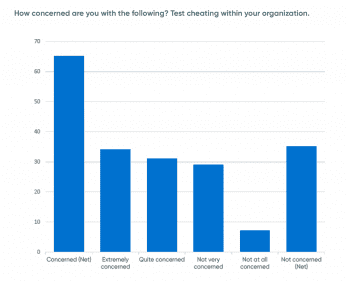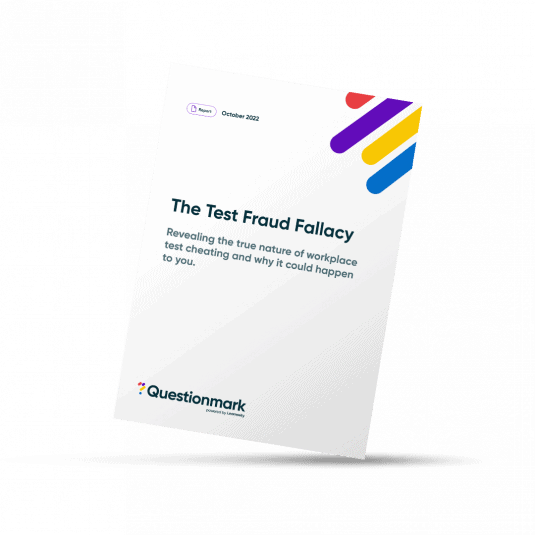Questionmark’s research
According to research conducted by Questionmark on US and UK businesses, test cheating is an issue keeping many people up at night. And quite rightly too. With the consequences of test cheating extending far beyond the individual that commits the act and resulting in long-lasting damage, it’s understandable that L&D professionals have the issue at the forefront of their mind.
But is cheating on a workplace test really seen as the disaster that it is and are businesses truly equipped to deal with it?
Our research lifted the lid on all this and more with some shocking results.
How concerned are businesses about workplace test cheating?
According to the latest Questionmark report, ‘The Test Fraud Fallacy’, when professionals from various industries across the US and the UK were asked how concerned they were about test cheating within their organization, over 60% responded that they were ‘concerned’.

Interestingly, while an overwhelming number were concerned about test cheating, there was still a staggering 35% of all respondents that weren’t concerned.
Is this because a significant number of people feel that test cheating simply doesn’t happen within their organization – or that it simply couldn’t because of their ironclad safeguarding measures?
Or is it because the consequences—often severe and long-lasting— aren’t truly understood?
What are the real consequences of workplace test cheating?
For those of us who work daily in the assessment industry, the repercussions of test fraud and cheating is old news by now. But for the corporate world it’s seemingly an act steeped in dissonance—even for those (as reflected in our research) working in the L&D space. While concern is often high, it is equally mishandled, misidentified and sometimes unintentionally encouraged.
But why?
Much of it seems to do with consequences. While many people might assume test cheating at work is a case of an individual simply cheating themselves, it is rather more serious than just flunking an exam.
Skim the news in recent months and you’ll discover not only tales of companies being fined gargantuan amounts, but also health and safety tragedies. But these are the headlines, in truth, test cheating has consequences that are often less newsworthy but still undoubtedly severe for the companies and individuals involved.

According to our research, 40% of those in the UK surveyed are spending £1 million or more as part of their yearly L&D budget, whilst 36% of the US are spending $1 million for theirs. And yet it was also true that only 36% of the companies we surveyed (hailing from industries like Finance, Education and Healthcare to name a few) said they would terminate employment if they found someone guilty of cheating. Just over half said they would take any disciplinary action at all. This is a jaw dropping amount given that workplace test cheating can devalue certifications, put unskilled workers in positions requiring competence and skew L&D training data.
In short, spending so much money on L&D only to treat test cheating as something not even worthy of disciplinary action is no different to building a house out of straw. Things might look good enough on the surface, but the foundations won’t weather a storm.
What’s the solution to workplace test cheating?
Like most insidious problems, the answer to test fraud and cheating in the workplace or anywhere else for that matter is rarely simple. While many business owners rely on the latest technology or a ‘watertight’ honesty policy to spare them from the snowballing problems test cheating causes, the truth is there is no silver bullet.
But that doesn’t mean there aren’t a handful of holistic tools, which when used together, can radically reduce test cheating and in many instances, stop it before it even begins.

If you’re unsure where to start or are concerned about missing a step, why not download Questionmark’s Comprehensive Test Fraud Checklist for Businesses, which outlines the necessary steps to deter, prevent, detect and respond to test fraud and cheating within the workplace.
And remember, one of the biggest reasons businesses falter when it comes to managing test cheating is that they have a limited understanding for what causes and defines it. For the full story of all that and more, download Questionmark’s latest report, The Test Fraud Fallacy, and discover the real perceptions, measures and misunderstandings of test fraud circulating in many businesses.